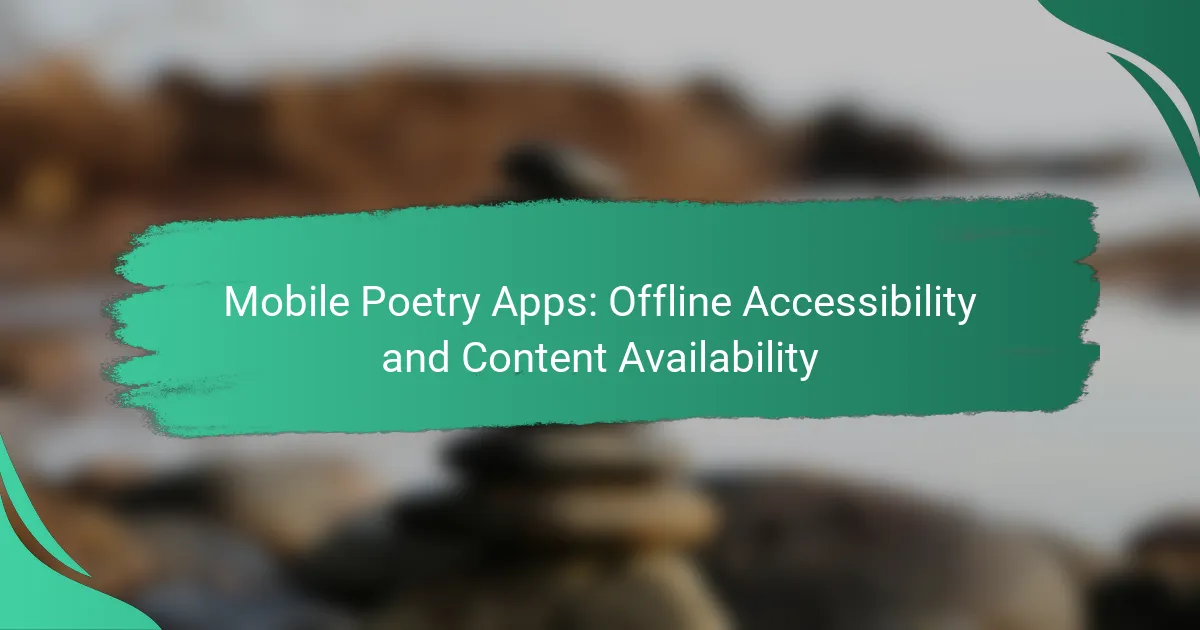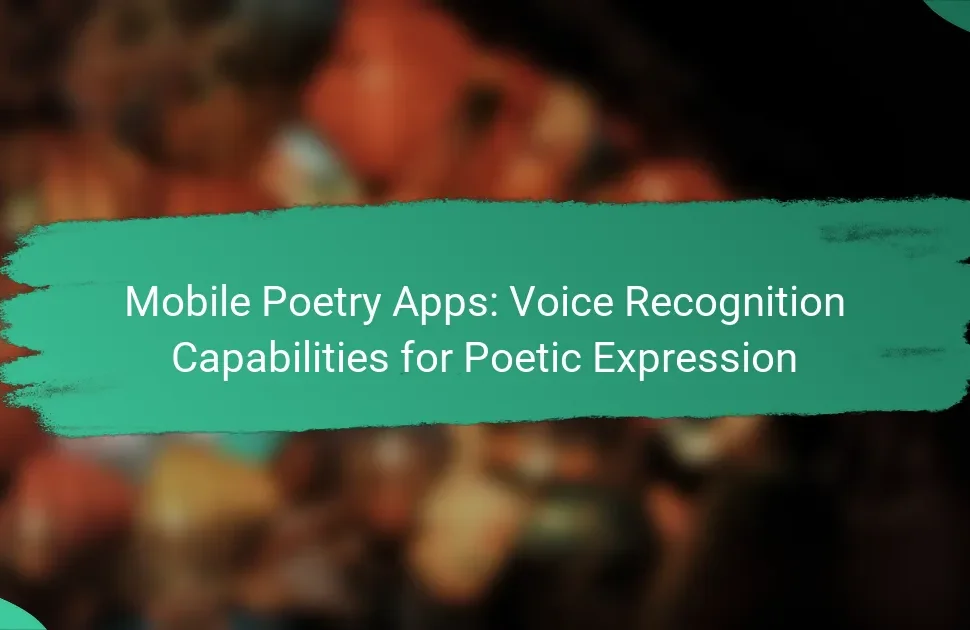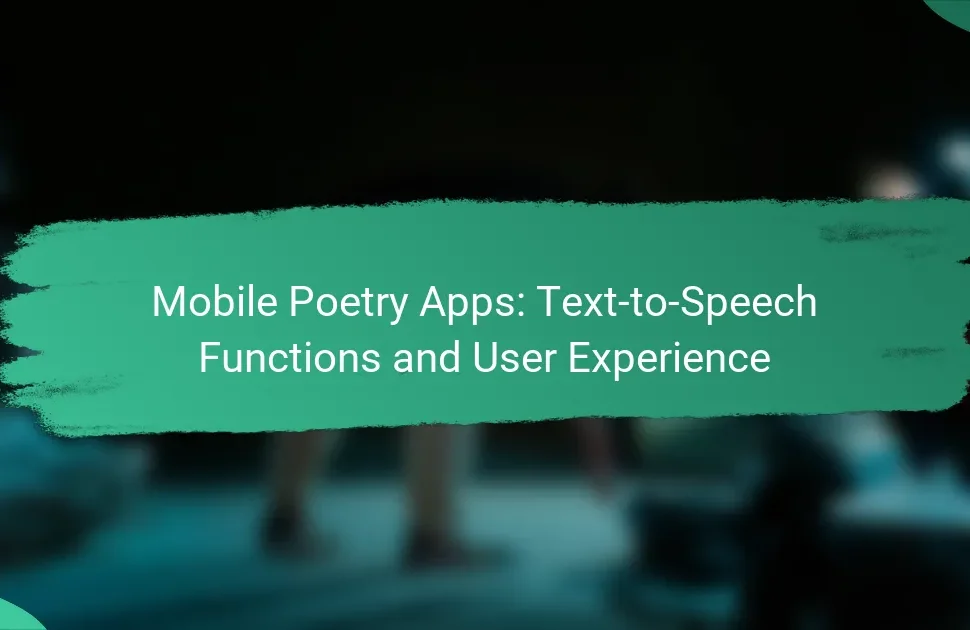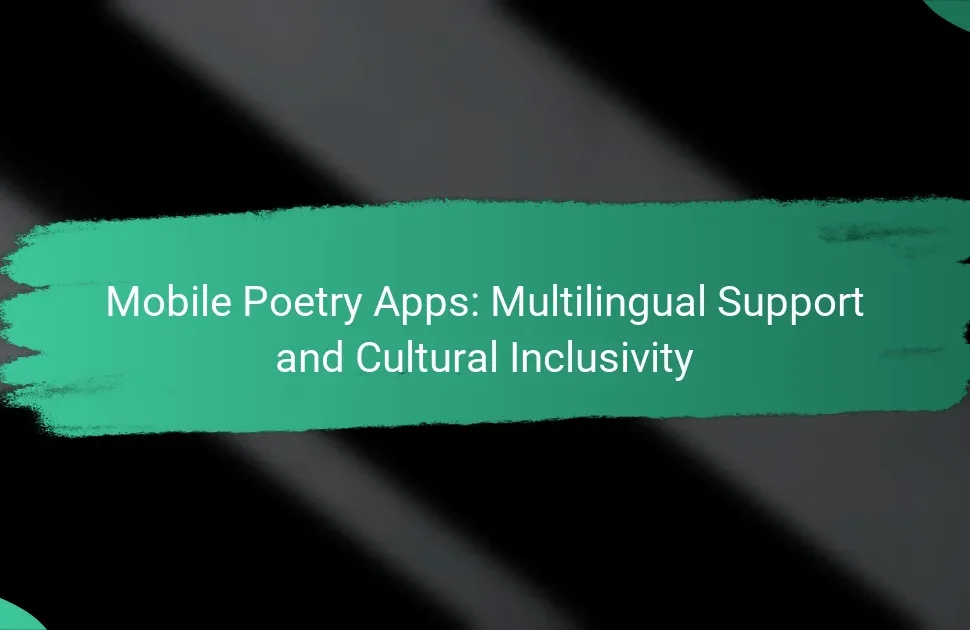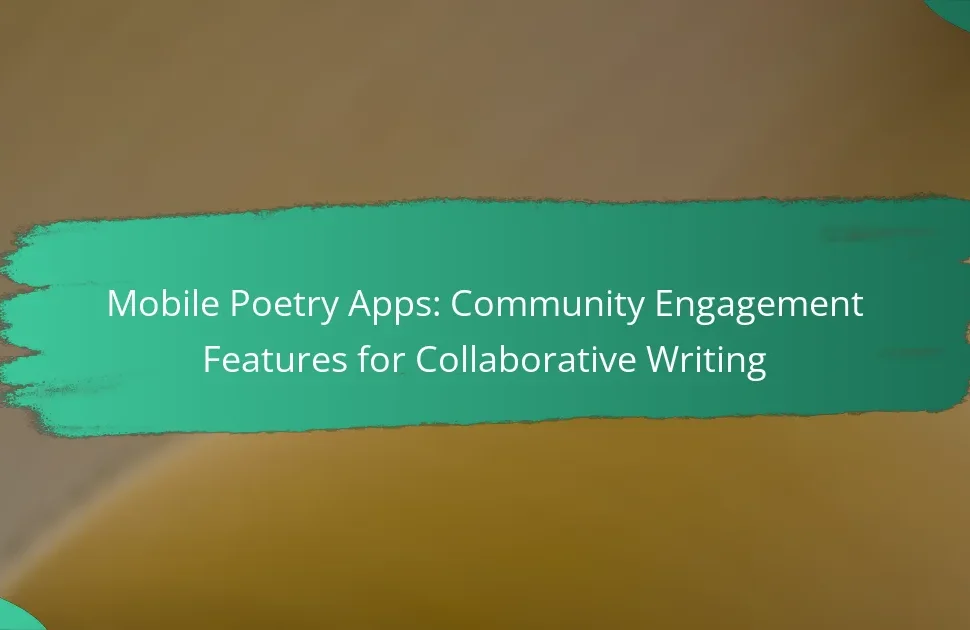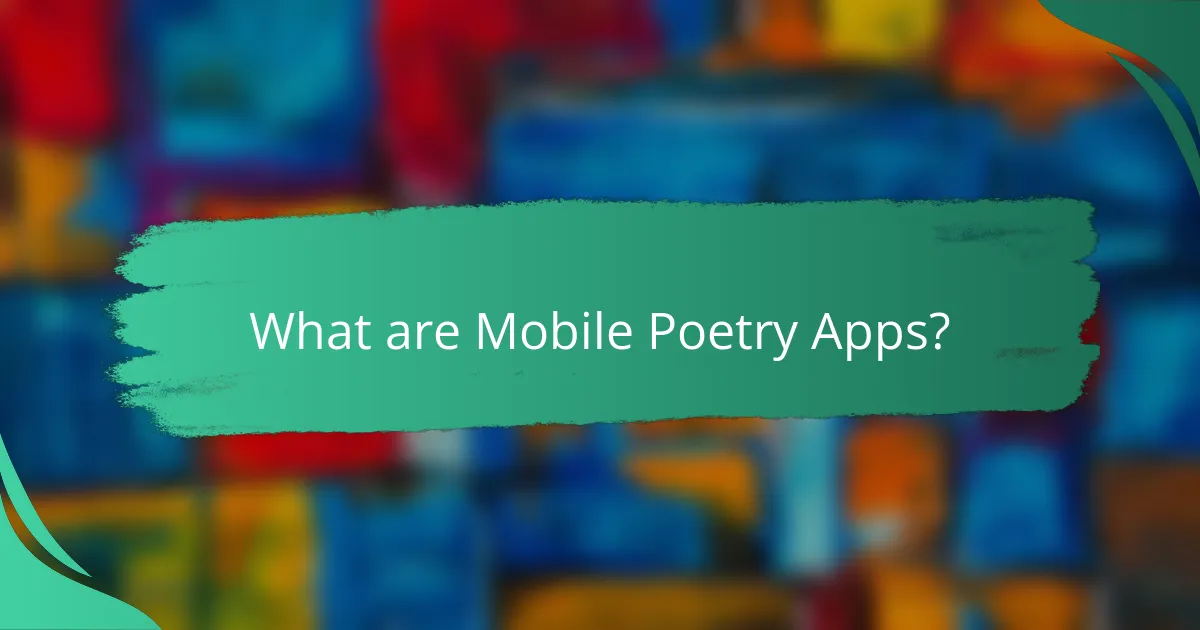
What are Mobile Poetry Apps?
Mobile poetry apps are digital applications designed for creating, sharing, and reading poetry on mobile devices. These apps provide users with tools for writing poetry, accessing a wide range of poetic works, and connecting with other poetry enthusiasts. Features often include customizable writing spaces, prompts for inspiration, and community sharing options. Many mobile poetry apps also allow offline access, enabling users to write and read without an internet connection. The growing popularity of mobile poetry apps reflects the increasing interest in poetry among diverse audiences. Statistics show that mobile app usage continues to rise, indicating a strong market for such creative platforms.
How do Mobile Poetry Apps function?
Mobile poetry apps function by providing users with tools to create, read, and share poetry. These applications often include features like text editors, templates, and prompts to inspire creativity. Users can save their poems and access them offline, enhancing accessibility. Many apps also allow sharing through social media or within the app community. Additionally, some apps curate poetry collections for users to explore. This functionality supports both amateur and experienced poets in their creative process. Overall, mobile poetry apps facilitate poetry engagement through user-friendly interfaces and community interaction.
What features are essential in Mobile Poetry Apps?
Essential features in mobile poetry apps include user-friendly interfaces, offline access, and diverse content availability. User-friendly interfaces allow poets to create and edit easily. Offline access enables users to read and write poetry without internet connectivity. Diverse content availability includes a wide range of poetry styles and forms. Additional features may include community sharing options. These enhance user engagement and collaboration. Customization options allow users to personalize their experience. Integration with social media facilitates sharing work with a broader audience. Overall, these features improve the usability and enjoyment of mobile poetry apps.
How do these features enhance user experience?
Offline accessibility and content availability in mobile poetry apps enhance user experience by providing uninterrupted access to literature. Users can read poems anytime, regardless of internet connectivity. This feature eliminates frustration caused by network issues. It also allows users to explore content in various settings, such as during travel or in remote areas.
Moreover, having a diverse library of poems readily available encourages users to engage more frequently with the app. Research indicates that easy access to content increases user retention rates. A study published in the Journal of Mobile Learning found that offline capabilities can boost user satisfaction by 30%.
These features create a seamless experience, fostering a deeper connection with poetry. Users appreciate the convenience and flexibility that offline access provides. Overall, these attributes significantly enhance the overall enjoyment and usability of mobile poetry apps.
Why are Offline Accessibility and Content Availability important?
Offline accessibility and content availability are important because they ensure users can access content without an internet connection. This feature enhances user experience by providing uninterrupted access to poetry anytime and anywhere. It is particularly beneficial in areas with limited or unreliable internet service. Studies show that users prefer apps that allow offline access, as it increases their engagement and satisfaction. Furthermore, offline availability can broaden the audience reach by accommodating users in diverse environments. This accessibility supports inclusivity, allowing individuals with varying internet access to enjoy the content. Therefore, offline accessibility and content availability are crucial for maximizing user engagement and satisfaction in mobile poetry apps.
How does offline accessibility benefit users of Mobile Poetry Apps?
Offline accessibility allows users of Mobile Poetry Apps to access content without an internet connection. This feature enhances user experience by providing uninterrupted access to poetry anytime, anywhere. Users can read, write, and share poetry in environments with limited or no connectivity. According to a study by Pew Research Center, 25% of adults often experience internet connectivity issues while on the go. Offline access ensures that these users can still engage with their poetry app without disruption. Furthermore, offline functionality can lead to increased app engagement, as users are more likely to explore content when they are not reliant on internet access. This accessibility can also encourage creativity, allowing users to write and reflect in moments of inspiration, regardless of their location.
What challenges do users face without offline access?
Users face significant challenges without offline access to mobile poetry apps. Limited access to content occurs when users cannot retrieve poems or materials without an internet connection. This can hinder creativity and inspiration during moments when users seek to write or read poetry. Additionally, users may experience disruptions in their workflow due to dependence on internet availability. Battery consumption can increase as users constantly search for connections, leading to potential device shutdowns. Furthermore, users may miss out on updates or new content that requires online access, limiting their engagement with the app. In areas with poor connectivity, users may find it difficult to use features that enhance their poetry experience. Overall, the lack of offline access restricts the usability and enjoyment of mobile poetry apps.
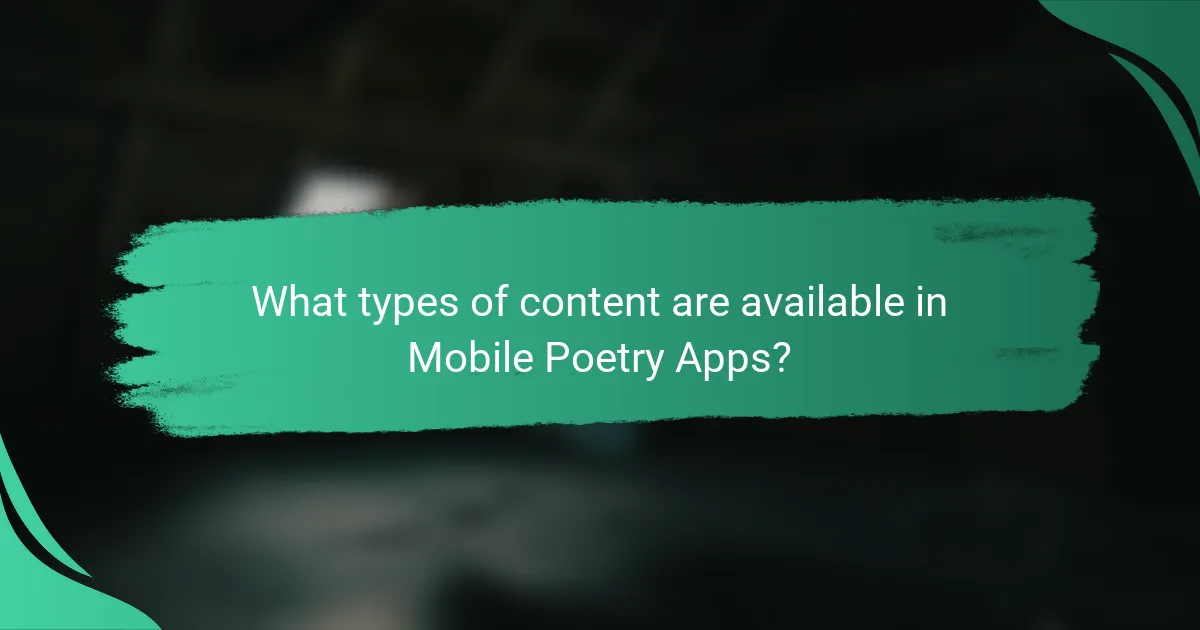
What types of content are available in Mobile Poetry Apps?
Mobile poetry apps offer various types of content. Users can access original poems created by both established and emerging poets. Many apps feature curated collections of classic poetry from renowned authors. Some platforms allow users to create and share their own poetry. Additionally, interactive features such as writing prompts and challenges are common. Many apps also include audio recordings of poems for auditory engagement. Users can find poetry analysis and discussions within the app. Some platforms provide community forums for sharing and feedback. Overall, mobile poetry apps serve as a comprehensive resource for poetry enthusiasts.
How is poetry content categorized in these apps?
Poetry content in mobile poetry apps is categorized based on various attributes. Common categories include genre, theme, and author. Genres may encompass forms like sonnets, haikus, or free verse. Themes can range from love and nature to social issues and personal experiences. Additionally, users may filter content by specific authors or collections. Some apps also offer curated lists or user-generated tags for easier navigation. This categorization enhances user experience by allowing targeted searches. Research indicates that organized content improves user engagement and satisfaction in mobile applications.
What are the different forms of poetry available?
The different forms of poetry available include sonnets, haikus, free verse, and limericks. Sonnets are 14-line poems often written in iambic pentameter. Haikus consist of three lines with a 5-7-5 syllable structure. Free verse does not adhere to a specific rhyme scheme or meter. Limericks are humorous five-line poems with a distinct rhythm and rhyme pattern. Each form has unique characteristics that define its structure and style.
How does user-generated content impact availability?
User-generated content enhances availability by increasing the volume and diversity of material accessible to users. This content is often created and shared by users, which means it can be produced more rapidly than traditional content. For example, platforms like social media allow users to upload poetry, making it instantly available to a wider audience. Additionally, user-generated content can fill gaps in content that may not be covered by professional creators. This phenomenon is evident in mobile poetry apps, where users can contribute their work, enriching the app’s library. Consequently, user-generated content leads to a more dynamic and extensive collection of poetry available offline.
What are the benefits of offline access in Mobile Poetry Apps?
Offline access in mobile poetry apps allows users to read and create poetry without an internet connection. This feature enhances accessibility, enabling users to engage with their content anytime and anywhere. It provides uninterrupted access to a library of poetry, which is particularly beneficial in areas with limited connectivity. Offline access also improves user experience by reducing loading times and ensuring instant availability of content. Additionally, it allows users to work on their poetry drafts without distractions from online notifications. Overall, offline access fosters creativity and convenience for poetry enthusiasts.
How does offline access improve the reading experience?
Offline access enhances the reading experience by allowing users to read without an internet connection. This feature eliminates distractions from notifications and ads. Users can engage more deeply with the content. Offline access also ensures availability in areas with poor or no connectivity. Studies show that uninterrupted reading improves comprehension and retention. A 2018 survey indicated that 75% of readers prefer offline access for focused reading. This accessibility fosters a more immersive experience, making poetry more enjoyable.
What are the implications of offline access for content updates?
Offline access for content updates limits real-time information availability. Users cannot receive immediate updates or new content while offline. This can hinder user engagement and reduce the freshness of content. For mobile poetry apps, this means users may miss out on new poems or features. Additionally, offline access can lead to outdated versions of content being displayed. Users may have to wait until they are online to access the latest updates. This can affect user satisfaction and retention rates. Overall, offline access poses challenges for maintaining current and relevant content in mobile poetry apps.
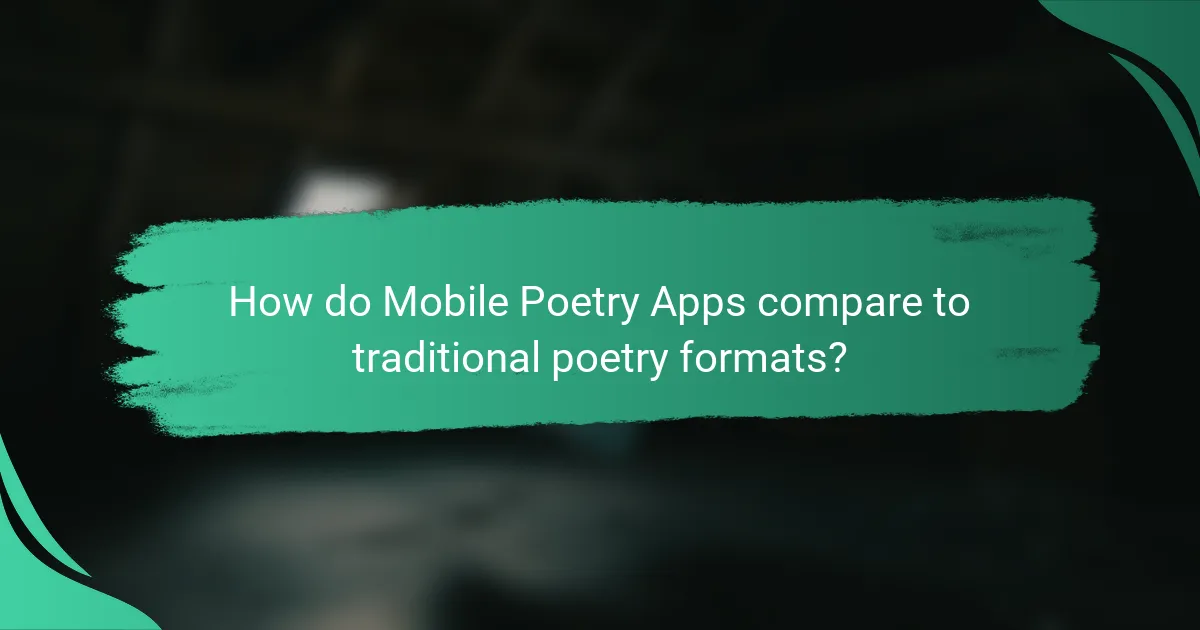
How do Mobile Poetry Apps compare to traditional poetry formats?
Mobile poetry apps offer unique advantages over traditional poetry formats. They provide instant access to a vast library of poems, allowing users to explore diverse styles and voices. Unlike printed poetry, mobile apps often include multimedia elements, enhancing the reading experience. Users can interact with poems through features like annotations and sharing options. Additionally, mobile apps can be updated frequently, ensuring fresh content is always available. Traditional formats lack this immediacy and interactivity. The convenience of accessing poetry anytime and anywhere is a significant benefit of mobile apps. In contrast, traditional poetry requires physical copies, limiting accessibility.
What advantages do Mobile Poetry Apps offer over printed poetry?
Mobile poetry apps offer several advantages over printed poetry. They provide instant access to a vast library of poems. Users can easily search and discover new works without physical limitations. Mobile apps also allow for personalized reading experiences through features like bookmarking and highlighting. Many apps include audio options, enabling users to listen to poetry as well. Additionally, mobile poetry apps often receive regular updates with new content. This ensures that users always have fresh material to explore. Lastly, mobile apps can be accessed offline, making poetry available anytime and anywhere.
How do Mobile Poetry Apps enhance accessibility for diverse audiences?
Mobile poetry apps enhance accessibility for diverse audiences by providing instant access to poetry on various devices. They allow users to read, write, and share poetry anytime and anywhere. These apps often feature adjustable text sizes and background colors, catering to users with visual impairments. Many apps include audio features, enabling users to listen to poems, which benefits those with reading difficulties. Additionally, mobile poetry apps often support multiple languages, reaching global audiences. They also provide platforms for underrepresented voices, promoting inclusivity in poetry. Many apps offer offline access, allowing users in low-connectivity areas to engage with content. Overall, mobile poetry apps democratize access to poetry, fostering a diverse community of readers and writers.
What unique features do Mobile Poetry Apps provide compared to books?
Mobile poetry apps offer unique features that enhance user experience compared to traditional books. They provide interactive elements, such as audio recitations and animations, which engage users more deeply. Users can customize their reading experience through adjustable font sizes and background colors. Many apps include social sharing options, allowing users to share their favorite poems easily. Mobile poetry apps often feature curated collections and personalized recommendations based on user preferences. They also enable offline access to content, allowing users to read without an internet connection. Additionally, these apps frequently update their content, providing access to new works and authors regularly. This dynamic nature contrasts with the static content of printed books.
What are the best practices for using Mobile Poetry Apps effectively?
To use Mobile Poetry Apps effectively, users should explore features like offline access, customizable settings, and community engagement. Offline access allows users to read and write poetry without internet connectivity. Customizable settings enable personalized experiences, enhancing user engagement. Community features facilitate sharing and feedback, fostering a collaborative environment. Regularly updating the app ensures access to new features and improvements. Utilizing prompts and challenges within the app can inspire creativity and enhance writing skills. Engaging with tutorials or guides can help users maximize the app’s potential.
How can users optimize their experience with offline features?
Users can optimize their experience with offline features by pre-downloading content. This ensures access to poetry and resources without an internet connection. Users should also regularly update the app to benefit from the latest offline capabilities. Enabling offline mode settings can enhance accessibility. Organizing downloaded content into folders aids quick retrieval. Utilizing bookmarks for favorite poems allows easy access offline. Users can also check storage settings to ensure sufficient space for downloads. Finally, familiarizing themselves with the app’s offline functionalities maximizes effective use.
What tips can enhance content discovery in these apps?
Utilizing effective tagging and categorization enhances content discovery in mobile poetry apps. Clear tags help users find specific themes or styles. Implementing personalized recommendations based on user behavior improves relevance. Allowing users to create and share playlists increases engagement. Regular updates with new content keep the library fresh and appealing. Integrating social sharing features expands reach and visibility. Utilizing search optimization techniques, like keyword inclusion, aids discoverability. User reviews and ratings provide insights, guiding new users to popular content.
Mobile poetry apps are digital tools designed for creating, sharing, and reading poetry on mobile devices, featuring functionalities such as offline access and diverse content availability. This article explores the essential features of mobile poetry apps, emphasizing the importance of offline accessibility in enhancing user experience and engagement. It discusses the various types of poetry content available, the categorization of this content, and the advantages of mobile apps over traditional poetry formats. Furthermore, the article highlights best practices for maximizing the use of mobile poetry apps, particularly through offline capabilities and effective content discovery strategies.
